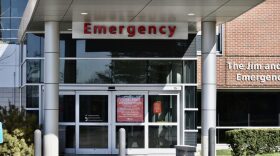When the state completes its $13 million purchase of Hampstead Hospital as expected this spring, the plan is to use the facility to expand emergency psychiatric care for children and youth.
Town officials in Hampstead say they support that goal, but are also concerned about a sizable loss in property tax revenue that will come with the government’s acquisition.
“We have a Hannafords; we have a Walgreens; we have four Dunkin' Donuts – count them,” said Laurie Warnock, a member of the Hampstead Select Board. “But the hospital is, if not the largest, then one of the two largest contributors to the tax base.”
Hampstead Hospital is currently owned by a private entity that pays an estimated $150,000 in annual property taxes on the 95-acre property. That revenue will disappear when the state assumes ownership, as the state isn’t required to pay property taxes on land it holds.
“The idea that the state was really putting such a concerted effort into providing services for youth and adolescents, I think that is great,” said Warnock, who works in public health. But with an annual town budget of around $8 million, the loss of Hampstead Hospital’s revenue “is definitely real money,” she said.
State officials have acknowledged the potential loss of revenue to the town, and the two sides are in negotiations over a voluntary payment, also known as a PILOT or “payment in lieu of taxes,” to fill some or all of Hampstead’s impending gap.
“The Department is working closely with Hampstead officials to avoid any negative impact on the town created by this transaction. We will be happy to discuss in more detail once there is a resolution,” said Jake Leon, a spokesperson for the New Hampshire Department of Health and Human Services.
Voluntary payments would be something of a novelty for the state. Each year, the state gives $175,000 to the City of Concord, the state capital and home to numerous government buildings, to support fire services. But according to the Department of Administrative Services, no other PILOTs are paid to municipalities that may be home to other state-owned properties such as Department of Transportation facilities.
Another concern for Hampstead town officials is the potential for increased demand on police and fire services with the expansion of the hospital, according to Joseph Gurthrie, who also serves on the town selectboard. The state has said it plans to employ a private security firm, as many privately owned hospitals do. State Health Commissioner Lori Shibinette has also said the state has no plans to construct any new facilities on the property.
For years, the state has struggled to provide enough mental health services for patients in critical need, including for children. That has led to delays in care and what’s come to be known as ‘ER boarding,’ where patients will languish for days, sometimes weeks, inside of an emergency room, waiting for a bed to open up.
With the acquisition of Hampstead Hospital, the state plans to convert the facility into a psychiatric treatment center for children and youth up to age 25. While staffing shortages have meant the current operators of the facility are only serving up to 45 patients at a time despite being licensed for 111 beds, the state is contracting private staffing firms to increase capacity to up to 65 patients.








